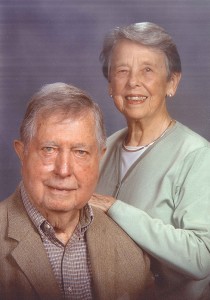George Kromhout: “A good life”
 November 2013
November 2013
Mission Hospice & Home Care patient Dr. George Kromhout, who will be 96 in December, would be the first to tell you he’s had a good life.
“I’ve had nothing but red carpets of opportunities during my life”, he said during an interview. He is now recovering at home from a broken femur, pneumonia, and the effects of several heart attacks. “Despite this, I am one of the most fortunate men I know.”
Dr. Kromhout was one of the earliest Kaiser Permanente doctors in San Francisco. He says his life has included a series of fortuitous events, including a full scholarship to the University of Chicago and making contacts during World War II that resulted in admission to medical school and a residency at Johns Hopkins, and a residency and fellowship at University of Utah medical school.
He met his wife, Thelma, on his first day at Bridgewater College in Virginia. They will celebrate their 72nd wedding anniversary in December. Their lifetime together has included four children, six grandchildren, and three great-grandchildren.
Thelma, 94, still plays tennis once a week and goes to the gym. She has been an active volunteer in many organizations, including the League of Women Voters, AAUW, and Friends of Filoli. She continues to be involved in her church, three book groups, and a garden club.
Thelma supported Mission Hospice from early in its history. She served two non-consecutive terms of six years each on the Board of Directors, including two years as President from 1985 to 1987.
“I thought it was wonderful that people could have terminal care at home,” she said. George also endorsed this concept. Thelma added that when she was involved, Mission Hospice was an organization that provided services only for dying patients and their families. Today, volunteers supplement a paid staff that also provides the pre-hospice Transitions program and a traditional home care service. The Kromhout care team includes Dr. Gary Pasternak, RN Annette Lacey, social worker Karri Kaiser, the Rev. Linda Siddall, and volunteer Curt Elsbernd.
George knows that hospice care is based on a prognosis of six months or less to live, but he also points out that patients have been known to “graduate” beyond hospice care. He and Thelma say they certainly didn’t expect to need hospice themselves when they first became a part of the organization, but they are grateful that it is available for them now, as well as for thousands of families who have received this care over the years.
